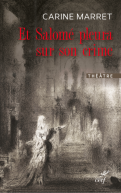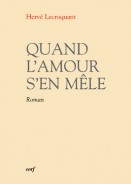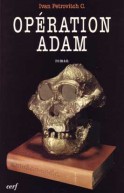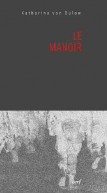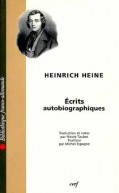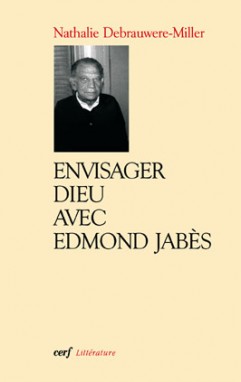
Envisager Dieu avec Edmond Jabès
Collection Cerf Littérature
320 pages - juin 2007
29,70€
« Mon œuvre [... ] tiendrait-elle dans les innombrables et contradictoires définitions de Dieu et ma solitude, dans la mort de ce mot ? » Ce questionnement est le point d'ancrage d'une longue méditation sur les écrits d'Edmond Jabès. Car il soulève les arcanes d'une œuvre fragmentaire où se dérobent les multiples contradictions du vocable « Dieu » ; et de la présumée mort de ce concept découleraient la solitude du poète et son angoisse de la déréliction. Le pari est lancé : aider Dieu à sortir du dédale de la question puisqu'il est l'ultime interrogation devenue livre. Un Dieu posé au confluent de la modernité occidentale qui a proclamé sa mort (Heine, Nietzsche, Mallarmé et Camus...), et des traditions juives témoignant par des conceptions antinomiques (le Talmud, le Zohar et la philosophie de Levinas) de sa survivance. À partir des diverses modalités du mot « Dieu » se font jour deux écritures paradoxales de la figuration et dé-figuration divine, dévoilant un conflit interne à l'œuvre et au judaïsme. Or, cette dé-figuration est-elle une tentative d'abolir la « figure » divine telle que l'exige « l'interdit de la représentation », ou le symptôme après la Shoah d'un ressentiment contre l'absence de Dieu ? La relation antagonique et néanmoins éthique qu'entretient Jabès avec le divin fomente-t-elle sa subversion du judaïsme ? Poète du déracinement et juif de surcroît, Edmond Jabès ne cesse de questionner Dieu, l'origine de l'homme, l'histoire et les racines du mal. « Envisager Dieu », c'est donc considérer l'entité divine incessamment dévisagée par Jabès sous ses innombrables « visages » : « Tous les visages sont le Sien ; c'est pourquoi Il n'a pas de visage. » « Envisager Dieu », c'est aussi suivre à la trace l'invention d'une Genèse insolite décelée au fil des livres. Or, en ravivant et commentant les mythes fondateurs de Dieu et de l'humanité, ne vient-elle pas donner un sens autre à l'œuvre d'Edmond Jabès ?
--
‘Will my work [... ] be contained in the countless and contradictory definitions of God and my solitude, in the death of that word?’ This question is the anchor point of a long meditation on the writing of Edmond Jabès, because it raises all the mystery of a fragmentary work from which emerge multiple contradictions of the term ‘God’; and because from the presumed death of this concept, the poet’s solitude and anguish of dereliction supposedly ensue. The challenge is announced: to help God escape from the maze of that question, because he is the ultimate interrogation, now in the form of a book. A God posed at the confluence of the Western modernity that proclaimed his death (Heine, Nietzsche, Mallarmé and Camus...), and Jewish traditions that bear witness with antinomical concepts of his survival (the Talmud, the Zohar and the philosophy de Levinas). From the diverse modalities of the word ‘God’, two paradoxical writings of the figuration and de-figuration of the divine come to light, revealing an internal conflict in the work and in Judaism. But, isn’t that de-figuration an attempt to abolish the divine ‘figure’ in as much as it demands ‘the prohibition of representation’? Or the post-Shoah symptom of a resentment against God’s absence? Does the antagonistic yet ethical relation Jabès maintains with the divine foment his subversion of Judaism? A poet of displacement and a Jew, Edmond Jabès constantly questions God, the origin of man, the history and the roots of Evil. ‘To consider God’, is to consider one of the divine entity’s many ‘faces’ being contemplated by Jabès: ‘All the faces are His; which is why he has no face.’ ‘To consider God’ also means tracking the invention of an unusual Genesis, revealed by successive books. But, might we not find that reviving and commenting the founding myths of God and humanity give another meaning to the work of Edmond Jabès?
--
‘Will my work [... ] be contained in the countless and contradictory definitions of God and my solitude, in the death of that word?’ This question is the anchor point of a long meditation on the writing of Edmond Jabès, because it raises all the mystery of a fragmentary work from which emerge multiple contradictions of the term ‘God’; and because from the presumed death of this concept, the poet’s solitude and anguish of dereliction supposedly ensue. The challenge is announced: to help God escape from the maze of that question, because he is the ultimate interrogation, now in the form of a book. A God posed at the confluence of the Western modernity that proclaimed his death (Heine, Nietzsche, Mallarmé and Camus...), and Jewish traditions that bear witness with antinomical concepts of his survival (the Talmud, the Zohar and the philosophy de Levinas). From the diverse modalities of the word ‘God’, two paradoxical writings of the figuration and de-figuration of the divine come to light, revealing an internal conflict in the work and in Judaism. But, isn’t that de-figuration an attempt to abolish the divine ‘figure’ in as much as it demands ‘the prohibition of representation’? Or the post-Shoah symptom of a resentment against God’s absence? Does the antagonistic yet ethical relation Jabès maintains with the divine foment his subversion of Judaism? A poet of displacement and a Jew, Edmond Jabès constantly questions God, the origin of man, the history and the roots of Evil. ‘To consider God’, is to consider one of the divine entity’s many ‘faces’ being contemplated by Jabès: ‘All the faces are His; which is why he has no face.’ ‘To consider God’ also means tracking the invention of an unusual Genesis, revealed by successive books. But, might we not find that reviving and commenting the founding myths of God and humanity give another meaning to the work of Edmond Jabès?
- Dimensions : 135x215x20
- ISBN : 9782204082792
- Poids : 425 grammes

